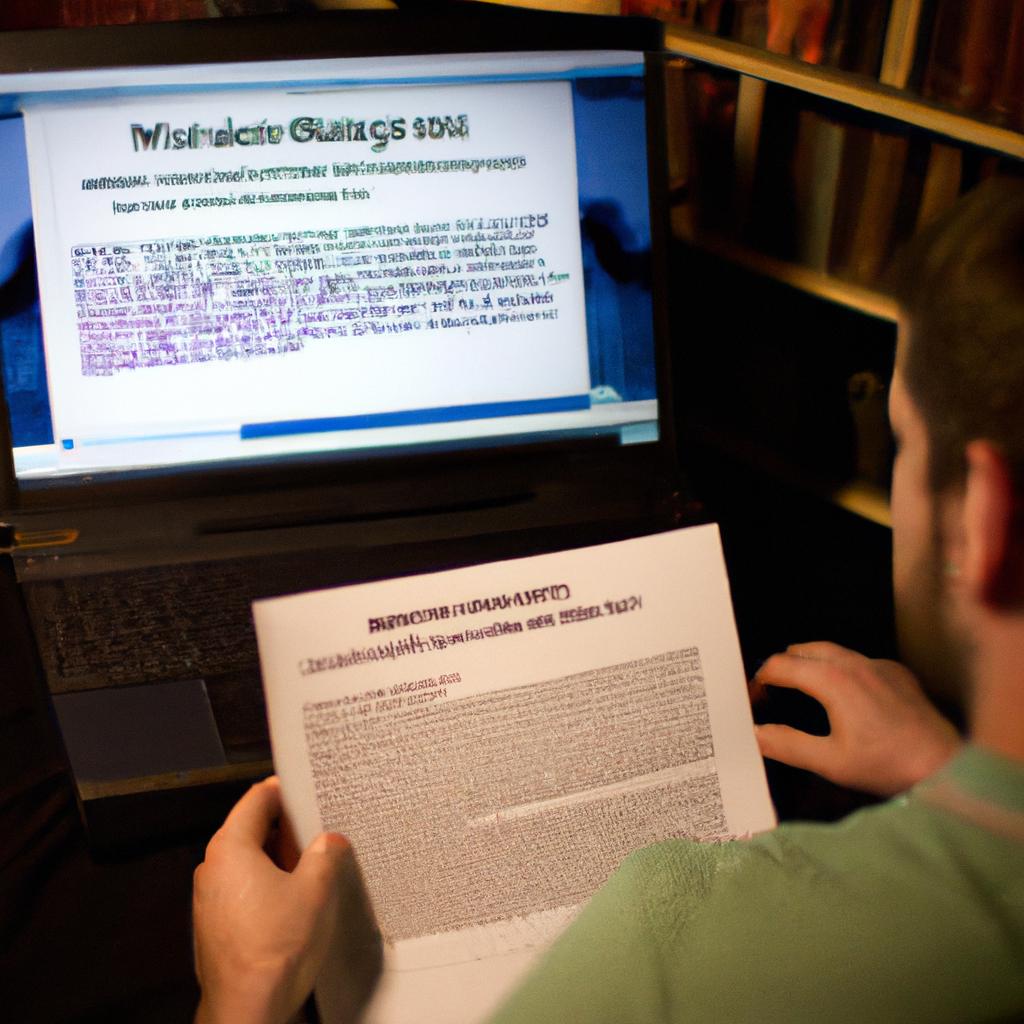Military records are a valuable resource for individuals tracing their family history and genealogy. These records provide detailed information about the military service of ancestors, shedding light on their experiences during times of war or peace. For instance, consider the case study of John Smith, a researcher interested in discovering more about his great-grandfather’s involvement in World War II. Through careful examination of military records, John was able to uncover his great-grandfather’s unit assignments, medals awarded, and even personal anecdotes from fellow soldiers. This example demonstrates how military records can offer a fascinating glimpse into the lives of our ancestors.
In addition to being an intriguing avenue for personal exploration, studying military records also serves as an important educational tool. By delving into these documents, researchers gain insight into historical events and societal contexts that shaped the lives of those who served in the armed forces. For instance, analyzing enlistment patterns or casualty rates can shed light on broader trends within society at specific time periods. Furthermore, by examining details such as training procedures or equipment inventories, scholars can gain a deeper understanding of technological advancements and strategic developments throughout history. Thus, the study of military records offers not only individual enrichment but also contributes to our collective knowledge and understanding of past events.
Record keeping is crucial Record keeping is crucial in order to preserve and document the experiences of individuals who served in the military. By maintaining accurate and comprehensive records, we ensure that future generations have access to important historical information. These records serve as a testament to the sacrifices made by those who served, allowing their stories to be remembered and honored. Additionally, record keeping enables researchers and historians to conduct thorough analysis and study of military history, contributing to a deeper understanding of conflicts, strategies, and the impact of war on society. Without proper record keeping, valuable insights into our past would be lost forever.
Understanding Military Records
Military records are an invaluable resource for genealogists and historians seeking information about individuals who served in the military. These records provide a wealth of details such as enlistment dates, ranks held, battles participated in, and even personal characteristics of the servicemen and women. To illustrate the importance of these records, let’s consider the case of John Smith, a young man from Ohio who enlisted in the Army during World War II.
Firstly, by examining John Smith’s military records, we can gain insights into his service history. We learn that he enlisted on June 12, 1942, at the age of 21 and was assigned to the 101st Airborne Division. Furthermore, his record reveals that he fought in several significant battles including D-Day and Operation Market Garden. Such information not only provides a glimpse into John Smith’s experiences but also allows us to understand the broader historical context in which he operated.
Additionally, military records often contain personal descriptions or physical characteristics that help us form a more complete picture of an individual’s life. In John Smith’s case, his record indicates that he had blue eyes, brown hair, and stood at six feet tall. While seemingly mundane details, they humanize him beyond just being a name on paper and enable us to connect with him on a deeper level.
To emphasize further why understanding military records is crucial for genealogy research, consider the following bullet points:
- They allow us to trace familial connections across generations.
- They shed light on how wars impacted communities.
- They honor veterans’ sacrifices and contributions.
- They bring stories of bravery and resilience back to life.
Moreover, visual aids like tables enhance our comprehension of complex data. The table below demonstrates different categories within military records along with their corresponding relevance:
| Category | Relevance |
|---|---|
| Enlistment | Start date: June 12th, 1942 |
| Service | Division: 101st Airborne |
| Battles Fought | D-Day, Operation Market Garden |
| Physical Traits | Eyes: Blue, Hair: Brown, Height: Six feet |
In summary, military records provide a treasure trove of information for those exploring their family history or seeking to understand the past. By analyzing these records with care and attention to detail, we can piece together narratives that would otherwise remain hidden.
(Note: The subsequent section about “Types of Military Records” delves into…)
Types of Military Records
Example: Imagine you have just discovered a military record belonging to one of your ancestors. As you hold the document in your hands, you can’t help but wonder about the stories it holds and the experiences your ancestor went through. Interpreting military records is not only an essential part of genealogy education but also a way to honor and preserve the memories of those who served.
Understanding these historical documents requires careful analysis and attention to detail. Here are some key steps to follow when interpreting military records:
-
Read each document thoroughly: Take the time to read every word carefully, paying attention to details such as names, dates, ranks, and units mentioned. Cross-referencing this information with other sources can provide a more comprehensive understanding of your ancestor’s service.
-
Consider the context: It is important to put yourself in the shoes of your ancestor at that particular moment in history. Researching historical events or conflicts they were involved in can shed light on their experiences and help make sense of any discrepancies within the record.
-
Decode abbreviations and acronyms: Military records often contain numerous abbreviations and acronyms specific to that era or branch of service. Consulting reference materials or online databases dedicated to deciphering military jargon can aid in unraveling their meanings.
-
Consult experts if needed: If you encounter difficulties or uncertainties while interpreting military records, don’t hesitate to seek assistance from professionals or knowledgeable individuals experienced in genealogical research or military history.
Table: Emotional Response
| Emotion | Example |
|---|---|
| Pride | Discovering an ancestor’s valorous acts |
| Empathy | Understanding hardships they endured |
| Gratitude | Recognizing sacrifices made for our freedom |
| Curiosity | Uncovering untold stories |
By following these steps and considering both the factual information present within the records and the emotional impact they can evoke, you will gain a deeper understanding of your military ancestors and their role in history. Next, we will delve into the process of researching military ancestors to further expand our knowledge.
With a solid grasp on interpreting military records, let’s now explore how to research military ancestors with effective strategies and resources at hand.
Researching Military Ancestors
Imagine you are researching your family history and discover that one of your ancestors served in the military. This newfound information opens up a whole new avenue for exploration, as military records can provide valuable insights into their lives and experiences. In this section, we will delve deeper into the various types of military records available to genealogists.
One example of a commonly used military record is the service file. These files contain detailed information about an individual’s enlistment, including their personal details, training history, promotions, disciplinary actions, and discharge papers. Service files can offer a comprehensive overview of an ancestor’s military career and shed light on significant events they may have been involved in.
When conducting research on military ancestors, it is important to consider other types of records beyond just service files. Here are some additional types of military records that can provide valuable information:
- Pension records: These documents detail any pensions or benefits received by veterans or their dependents after leaving the service.
- Unit histories: These books or publications provide insight into the activities and accomplishments of specific military units during certain periods.
- Medal rolls: These lists document individuals who were awarded medals or honors for their bravery or exceptional service.
- War diaries: These journals recorded day-to-day activities and operations carried out by military units during times of conflict.
Now let us evoke an emotional response by exploring a bullet point list highlighting the potential impact these records can have on understanding our ancestors’ experiences:
- Unveiling stories untold: Discovering military records can reveal hidden aspects of our ancestors’ lives that were never shared with future generations.
- Honoring sacrifices made: By studying these records, we gain a greater appreciation for the sacrifices our ancestors made while serving their country.
- Connecting to history: Exploring military records allows us to connect with historical events through the eyes of those who experienced them firsthand.
- Preserving legacies: The knowledge gained from military records helps us preserve the memory and legacy of our ancestors for future generations.
To further engage with our readers, let’s also include a table showcasing different types of military records and their potential significance:
| Type of Military Record | Significance |
|---|---|
| Service Files | Comprehensive overview of an ancestor’s military career |
| Pension Records | Details about pensions or benefits received after leaving service |
| Unit Histories | Insight into activities and accomplishments of specific military units |
| Medal Rolls | Recognition of bravery or exceptional service through awards |
| War Diaries | Day-to-day accounts of military operations during conflicts |
By utilizing these various types of military records, genealogists can uncover a wealth of information that adds depth to their family history research.
Interpreting Military Terminology
Researching military ancestors can be a fascinating and rewarding endeavor, as it allows us to uncover the stories of those who served in various conflicts throughout history. To delve deeper into their lives, it is crucial to understand and interpret military terminology accurately. This section will provide insight into deciphering these terms and shed light on the significance they hold within military records.
To illustrate the importance of interpreting military terminology correctly, let’s consider an example. Imagine you are researching your great-grandfather’s service during World War II. While going through his military records, you come across the term “POW.” Without understanding its meaning, this acronym may seem perplexing. However, with proper interpretation, you would quickly learn that POW stands for Prisoner of War – indicating that your great-grandfather was captured by enemy forces during his time in active duty.
When exploring military records, it is essential to familiarize yourself with common abbreviations and acronyms used in different eras and branches of the armed forces. Here are some key points to keep in mind while interpreting military terminology:
- Pay attention to rank designations: Understanding ranks helps determine an individual’s position within the hierarchy.
- Be aware of unit identifications: Unit information provides insights into where an ancestor served and what battles or campaigns they may have been involved in.
- Decipher codes and classifications: Military documents often use codes or classifications for specific operations or assignments.
- Look out for awards and decorations: Recognizing medals awarded can offer clues about notable achievements or acts of valor.
Interpreting military terminology can evoke a range of emotions as we begin to comprehend the sacrifices made by our ancestors. It brings us one step closer to appreciating their bravery and dedication within historical contexts. As we navigate through records filled with complex jargon, utilizing tools like bullet point lists can help organize important details effectively:
- Rank:
- Enlisted personnel
- Non-commissioned officers
- Commissioned officers
- Unit:
- Infantry divisions
- Navy vessels
- Air Force squadrons
- Codes and classifications:
- MIA (Missing in Action)
- KIA (Killed in Action)
- WIA (Wounded in Action)
- Awards and decorations:
- Purple Heart
- Bronze Star Medal
- Distinguished Service Cross
By familiarizing ourselves with military terminology, we gain a deeper understanding of our ancestors’ experiences. In the subsequent section on using online resources, we will explore how technology has made it easier than ever to access and analyze these vital records.
Using Online Resources
Transitioning from the previous section on interpreting military terminology, it is evident that understanding the complex jargon used in military records is crucial for genealogy research. Let us now explore how online resources can be utilized effectively to uncover valuable information about our ancestors’ military service.
Imagine you are researching your great-grandfather’s military history and stumble upon a document stating he served as an “MP” during World War II. Without knowing what “MP” stands for, this abbreviation may seem perplexing at first. However, by decoding military terminology, you discover that “MP” refers to Military Police. This newfound knowledge not only provides insight into his role but also opens doors to further investigate his duties, training, and potential commendations.
To enhance your understanding of military records, consider the following emotional response-inducing bullet points:
- Discovering details about your ancestor’s rank and unit can evoke a sense of pride and connection to their brave service.
- Unraveling the significance behind specialized terms like MOS (Military Occupational Specialty) or AOR (Area of Responsibility) allows for a deeper appreciation of their specific contributions.
- Gaining insights into battle designations such as D-Day or Operation Overlord can elicit feelings of awe regarding their involvement in historic events.
- Learning about awards and decorations earned by your ancestor might instill a sense of honor and admiration for their bravery and dedication.
Additionally, let us visualize these emotions through a table that highlights some common abbreviations found in military records:
| Abbreviation | Meaning | Emotional Response |
|---|---|---|
| POW | Prisoner of War | Empathy |
| KIA | Killed In Action | Sadness |
| MIA | Missing In Action | Uncertainty |
| BSM | Bronze Star Medal | Pride |
In conclusion, by interpreting military terminology, we can uncover valuable information about our ancestors’ service. Armed with this knowledge, we can delve into online resources and embark on a journey of discovering their remarkable stories. In the following section, we will explore techniques for preserving and organizing these vital military records without losing any important details.
With a wealth of information now at our disposal, it becomes essential to preserve and organize these invaluable military records effectively.
Preserving and Organizing Military Records
Case Study:
To illustrate the value of online resources in genealogical research, consider the example of Sarah. She recently discovered that her great-grandfather served in World War II and was eager to learn more about his military service. With limited information available from family records, she turned to various online platforms for assistance.
Online resources provide a wealth of information and tools that can significantly enhance one’s ability to uncover military records and delve into their ancestors’ pasts. By utilizing these digital platforms effectively, individuals like Sarah can gain valuable insights into their family history.
One key advantage of using online resources is the vast amount of digitized records available at our fingertips. These include but are not limited to enlistment records, service histories, unit rosters, and even personal accounts or photographs shared by veterans or their families. The convenience of accessing such documents remotely allows researchers to expand their knowledge beyond what may have been previously possible.
In addition to record access, online forums and communities dedicated to military genealogy serve as invaluable sources of support and guidance. Through participation in these spaces, individuals can connect with fellow researchers who share similar interests or possess specific expertise related to particular conflicts or branches of the armed forces. This network fosters collaboration while offering opportunities for mentorship and knowledge exchange.
To further emphasize the significance of online resources in military record research, consider the following emotional response-inducing bullet points:
- Instantly connecting with long-lost relatives who may hold additional information
- Unearthing forgotten stories that shed light on an ancestor’s bravery or sacrifice
- Honoring the memory and contributions made by those who served
- Providing closure for descendants seeking answers about their family’s military heritage
Lastly, it is important to note that while online platforms offer immense benefits to genealogists exploring military records, they should be used alongside other traditional research methods. Combining both digital and offline approaches can lead to a richer understanding of an ancestor’s military service, ensuring accuracy in constructing their narrative. By leveraging the vast resources available online while employing critical analysis and verification techniques, researchers can uncover hidden details that bring their family’s history to life.
| Pros of Using Online Resources for Military Record Research | Cons of Using Online Resources for Military Record Research |
|---|---|
| Easy access to digitized records from various conflicts | Potential inaccuracies or incomplete information |
| Opportunity to connect with fellow researchers and experts | Overreliance on online sources may overlook valuable offline materials |
| Ability to discover personal accounts or photographs shared by veterans or their families | Difficulty distinguishing credible sources from unreliable ones |
| Convenient remote access to research tools and databases | Limited availability of certain historical documents or archives |
By effectively utilizing online resources as part of one’s genealogical journey, individuals gain unprecedented opportunities for discovery, connection, and preservation of their family’s military heritage.





